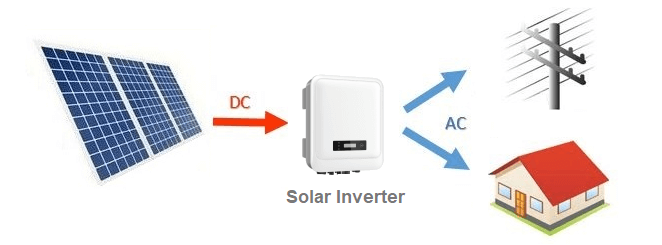
La question de savoir si l’énergie solaire est suffisamment efficace pour alimenter une maison entière est une question que se posent de nombreuses personnes lorsqu’elles envisagent d’installer un système d’énergie solaire.. La réponse n'est pas un simple oui ou non, car il y a plusieurs facteurs à considérer.
D'abord, il est important de comprendre comment fonctionnent les panneaux solaires. Les panneaux solaires sont constitués de photovoltaïque (PV) cellules, qui convertit la lumière du soleil en courant continu (CC) électricité. Cette électricité continue est ensuite convertie en courant alternatif (CA) électricité par un onduleur solaire, qui peut être utilisé pour alimenter des appareils et des appareils dans les maisons et les entreprises.
La quantité d'électricité qu'un système d'énergie solaire peut produire dépend de plusieurs facteurs, y compris la taille du réseau de panneaux solaires, l'orientation et l'angle des panneaux, la quantité de lumière solaire que les panneaux reçoivent, et l'efficacité des panneaux solaires eux-mêmes. En plus, la quantité d'électricité utilisée par une maison joue également un rôle pour déterminer si l'énergie solaire peut ou non alimenter toute la maison..
Déterminer si l’énergie solaire est suffisamment efficace pour alimenter une maison entière, il est important de considérer les besoins énergétiques de la maison. Cela inclut le nombre d'occupants, la taille de la maison, et les appareils et appareils utilisés régulièrement. Les besoins énergétiques d'une maison peuvent être calculés en examinant les factures d'électricité mensuelles et en déterminant la quantité moyenne d'électricité utilisée par mois..
Une fois les besoins énergétiques de la maison déterminés, la taille du réseau de panneaux solaires peut être calculée. Une règle générale est qu'un 1 Un réseau de panneaux solaires kW peut générer entre 4-5 kWh d'électricité par jour. Donc, un 5 Un réseau de panneaux solaires kW peut générer environ 20-25 kWh d'électricité par jour. Cette quantité d'électricité peut être suffisante pour alimenter une maison de petite ou moyenne taille., en fonction des besoins énergétiques de la maison.
Il est également important de considérer l’orientation et l’angle des panneaux solaires. Idéalement, les panneaux solaires doivent être orientés vers le sud et inclinés selon un angle égal à la latitude du site d'installation. Cela permet aux panneaux solaires de capter le plus de lumière solaire tout au long de la journée.. Cependant, même si les panneaux solaires ne sont pas orientés vers le sud ou ne sont pas à l'angle optimal, ils peuvent toujours produire de l'électricité.
En plus de l'orientation et de l'angle des panneaux solaires, il est important de considérer l’efficacité des panneaux solaires eux-mêmes. L'efficacité d'un panneau solaire mesure la quantité de lumière solaire convertie en électricité.. Plus l'efficacité est élevée, plus le panneau solaire peut produire d'électricité. Les panneaux solaires à haut rendement peuvent être plus chers que les panneaux à moindre rendement, mais ils peuvent aussi produire plus d'électricité et nécessiter moins d'espace sur le toit.
Un autre facteur à considérer est l’utilisation d’appareils et d’appareils économes en énergie à la maison.. Les appareils et appareils économes en énergie consomment moins d’électricité, ce qui peut aider à réduire les besoins énergétiques globaux de la maison. En plus, les appareils et appareils économes en énergie peuvent être associés à un système d'énergie solaire pour réduire davantage la quantité d'électricité nécessaire au réseau.
En conclusion, La question de savoir si l'énergie solaire est suffisamment efficace pour alimenter une maison entière dépend de plusieurs facteurs., y compris les besoins énergétiques de la maison, la taille du réseau de panneaux solaires, l'orientation et l'angle des panneaux solaires, l'efficacité des panneaux solaires, et l’utilisation d’appareils et d’appareils économes en énergie. Avec une planification et une installation appropriées, un système d'énergie solaire peut fournir une source fiable d'énergie propre pour les maisons et les entreprises.
